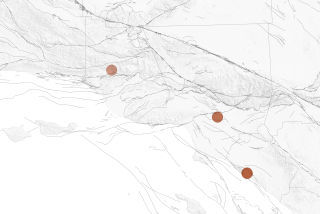Shaking Out the Facts
- Share via
The recent cluster of earthquakes that have jolted our fair state show nothing more or less than the truism that random events happen randomly. The human mind seeks to find order in nature, so we think that if four earthquakes occur in a fortnight they must somehow be related by a discernible cause.
The fallacy is psychological. Earthquakes occur all of the time all over the world with a certain statistical regularity, but they are normally small enough and dispersed enough that we pay them no mind. Occasionally, larger quakes occur that catch our attention, and, even more occasionally, several larger quakes occur near each other in time or place. These really catch our attention--especially if the place happens to be where we are.
This situation is not unlike a baseball player going on a “hot streak” at the plate. A .300 hitter, on average, gets three hits every 10 times at bat over the course of a season. What would be surprising is to find that every 10 times up he got exactly three hits. That would involve a regularity unknown in baseball and in nature.
Rather, a hitter’s productivity varies. He does well for a while, then poorly, then better than before, then not so poorly, and so on. These are normal statistical fluctuations. But when they fluctuate to the extremes we call the resulting run a “hot streak” or a “slump”--implying that there is some cause at work other than chance.
It’s just that we notice only the extremes of batting, just as we notice only the extremes of earthquakes or the extremes of weather--which is also an essentially random event. Some winters are colder than average and some summers are hotter than average, but that is only because the average, by definition, obscures the extremes.
Bishop is shaking these days, and it may shake some more. Eventually there will be a big earthquake in California, but whether it comes sooner or later is unrelated to the cluster of quakes of recent days. Clustering is a phenomenon of statistics, not of seismicity. “The earthquake process is random,” says Lucille M. Jones, a geologist at Caltech. If random events occurred at regular intervals, they would not be random.
More to Read
Sign up for Essential California
The most important California stories and recommendations in your inbox every morning.
You may occasionally receive promotional content from the Los Angeles Times.













